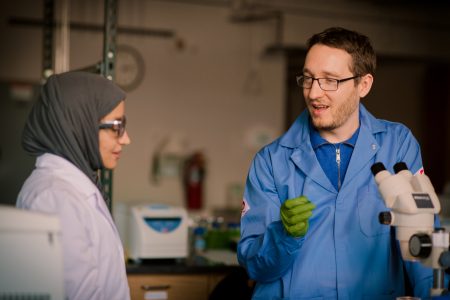Assistant Professor Paul Goetsch received a $423,381 grant from the National Institutes of Health. Dr. Goetsch will study how the DREAM transcriptional repressor complex regulates the cell cycle of cellular progression and cellular quiescence.
Cellular division is extremely important as an organism grows to maturity, but just as important are the mechanisms that stop cells from dividing. Dysfunction in cellular quiescence generally leads to the development of cancer cells, Goetsch explains.
Working in the model system Caenorhabditis elegans, a 1 mm-long transparent nematode, the Goetsch lab is using CRISPR/Cas9-mediated genome editing to disrupt how the DREAM complex forms and test how that affects its function. “By exploiting advances in genomic editing and genetic tools in a tractable model system, we will gain new insights into how the DREAM complex protects cellular and organismal health,” says Goetsch.
Another part of the grant supports bringing research directly into the classroom for Biological Sciences students in the second-year genetics lab. Goetsch and his colleagues are implementing Course-based Undergraduate Research Experiences (CUREs). These are used to provide students a glimpse into research opportunities within the department.
In Spring 2021, Goetsch and his student Emily Washeleski developed a unique experiment combining C. elegans genetics with environmental microbiology. “We are continuing to expand upon our CURE approach to provide students equitable access to research experience as a cornerstone of their professional development within the department,” Goetsch says.
This blog post initially appeared in the Fall 2022 Biological Sciences Newsletter. Read this article and others like it today.
